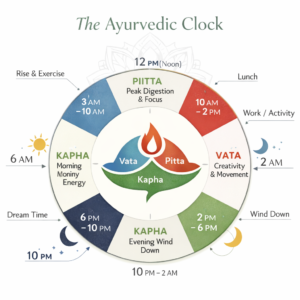What environmental changes have you noticed lately ? Dryness ? Cold ? Darkness ? Dampness ? Winter is a season mainly governed by Kapha (water/earth elements) with occasional Vata (air/space elements) days.
Main seasonal qualities are cold, wet, heavy, cloudy and slow with occasional bouts of dryness.
It is necessary – if our body doesn’t do it intuitively – to adjust to this changing environment. This is what this Ayurveda Winter Routine Guide will help you with.
As you probably have paid attention to environemental changes, have you – as well – noticed subsequent changes in your daily rythm, your behaviours and your dietary & lifestyle preferences ?
As the outside changes in the winter season, so does (or at least should) our behaviours to maintain harmonious relationship between body & it’s direct environment.
Sometimes unfortunately, our minds have other plans. It much prefers to keep following its own agenda ! With the culture of PRODUCTIVITY OR KEEPING BUSY AT ALL COST this unfortuneatly disconect us from the environment and our true natural bodily needs.!
So, here below are Ayurveda winter season reminders of sensible winter adjustments..
Please note that as everyone is different, everyone should adopt different diet & behaviours in this season.So please be mindful of your own personal constitution and medical condition. Or consult a professional who can assist you.
“In strong persons, the cold of the winter obstructs the escape of the heat. This makes the digestive fire very strong inside. In case of inadequate fuel for the fire, it will digest body tissues.”
AH Sū 3.7b – 8
- In winter, healthy people with strong agni (or digestive fire) will feel increased appetite.
- It is therefore necessary to eat according to appetite to prevent depletion of bodily tissues (vata aggravation).
- For the weaker individuals, agni (or digestive fire) will also be weak. Due to the cold digestion will become weaker and we will likely suffer from indigestion (IBS, bloating, constipation, pain, slow digestion, gas etc.)
- In winter, we may feel hungrier than usual in the mornings, due to longer nights which give plenty of time for thorough digestion. If we feel hungry in the morning, it is important to eat something according to appetite or else the digestive fire will digest our healthy bodily tissues, causing weakness and depletion.
In early winter, late winter and rainy season the first three tastes (sweet, sour, salty) are recommended.
AH Sū 3.55b-56a
- In winter, the sweet, sour and salty tastes are recommended for both the strong and the weak.
- Although sour tastes increases agni, it is beneficial as it balances vata/the air element and the cold, dry, light and rough qualities.
“Unctuous foods can be used in winter”
AH Sū 3.56b-57a
- Uncutous foods help compensate the excess dryness that naturally occurs in the winter season.
All the tastes should be used regularly at all times. The specific tastes recommend for a particular season should be used predominantly.
AH Sū 3.57b
All tastes are to be eaten : sweet, sour, salty, astringent, pungent, and bitter. But more so of the sweet, sour and salty. Of course all this needs to take individual consitution in consideration.
Nourishing foods are recommended in the winter (althought they should not be too heavy either) – as we mostly have a strong digestive fire. Nourishing foods may include :
- Warm, cooked, spiced, unctuous diet with a little more fat than usual.
- Winter is a good time for root vegetables, soups, well cooked and spiced grains (wheat and rice) and meat soups from healthy animals (for non-veg)
- Some healthy fats: olive oil, ghee or butter (from healthy animal sources)
- As well as milk from healthy animals – warmed up and spices
- Warm spices & herbs in dishes or in teas such as cumin, ginger, cardamom, cinnamon, cloves, oregano etc.
- Using home remedies to prevent cold & flu such as this one
Cold, raw and excessively dry foods are to be avoided. These may be :
- Dairy is to be avoided (although milk can be taken warm with spices)
- Salads and raw food are not advised
- Fruits are preferred cooked and spiced
- Pulses can be taken in soup format with a healthy fats and spices such as cumin, garlic and turmeric to facilitate digestion.
- Processed foods, white flour and sugars are not supportive of a healthy immune system and should be avoided.
- Sipping on warm teas and water and avoiding cold drinks
- Avoid excessive amounts of alcohol which is drying and depletes the immune system — read more here
Check ayurveda winter recipes here
AYURVEDA WINTER LIFESTYLE
During this time, the nights are very long, and one can feel hungry (early) in the morning rather than later in the day. […] one should practice strong massage of the body and head with vata reducing oils.
AH Sū3.9-10
” For the purpose of cleasing pleasantly warm water should be used.”
AH Sū 3.13
“Warm & light material to cover the body [during sleep]. Expose the body to sunshine and use footwear at all times.”
AH Sū 3.14
- In general it is recommended to follow Nature’s slower pace and slow down our activities. Enjoy good company, lots of cuddles -using bodily heat as a warmer – and laughter in warm environments, both warm for the body and the heart!
- In order to keep vata in balance, all sorts of massage with warm oils (temperature & property) are recommended daily. Sesame oil is mostly recommended in winter season. Any self care rituals are welcome. You can also visit our centre for an Ayurveda massage therapy, you will find more information about our massage offering here
- A mild and gentle form of daily activity (tai-chi, yoga, walks etc.) is suitable, unless one feels heavy and lethargic in which case a more dynamic form of activity is recommended. You can try this 7minutes morning streching routine
- Making sure one gets enough sleep in the winter season, retiring early to bed early and allowing the body to rest and prepare for the more active spring and summer seasons.
- Warm & light clothes are recommended to be worn or used to cover the body. Avoid keeping feet cold, as it further aggravates vata.
- And of course a lot of sunshine…or as much as possible at least !
AYURVEDA WINTER ROUTINE KEY TAKEAWAYS
In short here are things you should remember :
- Moist, warm diet
- Sweet, sour, salty tastes
- Nourish yourself sufficiently if you have strong agni
- Exercise and receive of self massage regularly with warming oil
- Slow down and take time to rejuvenate the body
- Enjoy warm, friendly company, laughter, warm embraces and sleep early
- Dress & cover up with warm yet light clothing.
Wishing you a healthy winter
Elena
Elena Beurdeley
Ayurveda Practitioner (Nutrition & Lifestyle) DipANC(Ayur) |DipPrac(Ayur)
Massage Therapies – DipAMT(Ayur) | Traditional Thai Massage
Yoga Instructor (Hatha | Yin | Trauma Informed)
The Ayurveda Centre – Athens
#ayurveda #winter #nutrition #naturalhealth









